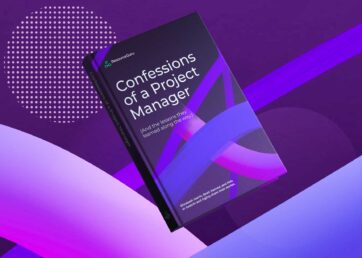Managing projects and staff requires a talent for balancing whatever comes across your desk—meaning you benefit from being centered, too!
Whatever your role or job title, picking up new ways to minimize stress and become the most confident and happy version of yourself is a great idea. Adding even one stress-busting activity to your day can improve your health, the quality of your work, and interactions with your team and clients.
When project managers Brett Harned and Sloan Miller proposed a “meditation for professionals” class hosted by DPM Philly (a meetup for digital project managers in Philadelphia), Resource Guru was happy to help. We agreed that it was a fantastic idea—practical strategies for staying calm, happy, and in the zone can make even the most challenging projects fun again; even small adjustments to reduce stress points can tremendously benefit you and your team .
When it comes to project-wrangling experience, look no further than Brett and Sloan. As PMs who can run projects like nobody’s business, when they have advice, you know it works. We had a great chat with them following the event, and they were eager to share their secrets to staying happy and productive.
Watch our blog! Great tips, resources, & the full scoop on “Mindful Meditation in the Workplace” is going to be posted soon!
In this article 📖
What first inspired you to look into relaxation or meditation techniques?
Brett Harned: Project managers are often stressed, so we wanted to find a way to share some techniques to calm down.
I personally started the year with a goal to meditate for 10 minutes every day. I have done pretty well sticking to it, but honestly never did enough research to know if I was doing it the right way.

Brett Harned kicking off DPM Philly’s “Mindful Meditation in the Workplace”
Sloan Miller: Over the last 13+ years of working as a PM in some form or another, I’ve found that stress becomes a far too common element in our lives. Experiencing stress in this line of work is a certainty, and good PMs need to be able to shed or compartmentalize it as they transition from project to project, meeting to meeting, event to event.
About 7 years ago I could feel that I needed to find a better, more constant, and more reliable way to release my stress to be able to continue to perform my duties as best as possible … that’s how I found yoga. And as Erick said during the class, once you begin practicing mindful awareness of your physical body, doing so for the mental side is the next natural step.
I practice yoga between 2 and 4 times a week, and I meditate for a few minutes daily. I try to attend a meditation class about once a month to continue to integrate new techniques and approaches to my practice.

Sloan Miller prepping for “Mindful Meditation in the Workplace”
What is it about the modern work environment that makes mindfulness techniques so valuable?
Brett: Being in front of a screen at all times sure makes you vulnerable to more communication, which can end with more stress.
Sloan: We live and work in a very fast paced world. We are constantly on our phones or computers, scrambling to get our work done. “Work hard, play hard” was a very common catchphrase in our industry for a few years, which meant that people tend to burn the candle at both ends. In recent years, a work/life balance has become more of a benefit of some places of employment, or even a rallying cry.
I believe that you really cannot achieve that desired balance without being mindful of the need to meditate, exercise, relax, and/or unwind in some dedicated manner. Much like reviewing your task list to know what you have to accomplish in a day, or making the time to clean out your inbox of those emails you haven’t answered in the last week, that balance will not just happen—it has to be crammed into your schedule and that time block needs to be as respected as all those other pressing matters already on your calendar, because it really is that important to your long-term health.
What tips do you use to stay in that “calm zone”—especially when you’re in the midst of a rough day at work?
Brett: Take breaks. If something stresses you out, put it aside for a minute. Get up, take a walk, and get some fresh air. If you take some time with a clearer head to dissect the issue, you’ll approach it differently.
Sloan: I think that recognizing that you are in a state of stress is the first step. Our body’s “flight or fight” response is in part designed to mask our normal reaction to things, giving us the adrenaline and focus to complete the “emergency” task at hand, regardless of the circumstances around us.
Knowing ourselves and our body—and when we need to intentionally calm ourselves—is the first step. And then having a short routine that works for you is ideal. For some, it’s taking a 5 minute walk around the office or outside; for others, it’s getting up from their desk and stretching, or perhaps listening to music. A friend of mine who spends most of his days in meetings (sometimes in the same room for hours), makes a conscious effort at the end of every meeting to get up, walk around the table, and find a new seat before the next one. Just simply changing your view can have a tremendous impact.


“Resource Guru has the perfect balance of simplicity and detail. It’s easy to see where issues might arise.”
What made you decide to put together this event? How did you find the instructor?
Brett: This is a Sloan question!
Sloan: The four-member organizing team of DPM Philly met up in January for drinks and to discuss the upcoming year. We all agreed that our skillset—the things that we do within our industry—aren’t exclusive, they aren’t solely for project managers. So, we wanted to organize a few events this year that had a larger appeal to those within the technology and creative fields.
Stress is one thing that we know is a constant throughout our industry. Being able to effectively deal with, manage, and release stress should be a universal tool and we thought that it would make for a very interesting, unique, and fun networking event.
I met Erick DuPree about 3 years ago at DIG Yoga Studio where he is the assistant studio manager. He organizes the class and the front desk schedules, works with both instructors and students, plus he teaches both yoga and meditation. Having been through a few of his classes and sessions and knowing that he has a background as an IT Project Manager, I thought that this would be a perfect match. Having experience in both industries, Erick would intimately know how the daily lives of many of our audience members unfold, and I thought that he could be a very suitable guide for us.
What were your takeaways from the meditation class? Did it change how you felt physically and mentally?
Sloan: Erick made the event fun, educational, and relaxing. He understood that people have very stressful lives, and that dedicating time to attend an event such as this was a choice and he rewarded us for doing that.
I really enjoyed Erick’s three or four methods of practicing in a simple way at home and at the office. Those demonstrations—the difference between grounding yourself and breathing, and standing and breathing—were great takeaways.
Brett: I loved that Erick understands what it means to be a PM and what that stress looks like. That made him really relatable, and it allowed him to share valuable tips with us.
How does this help project management?
Sloan: I think that this event showed the value in taking the time to be mindful, to intentionally take a pause, to slow things down. In our crazy busy lives, taking this extra time to just put your feet squarely on the ground and breathe is so simple yet very effective. This slight break from the action give you time to reflect, be more peaceful, and allows you to focus so that you have a renewed energy and mindfulness when you resume your work.
Brett: I think no matter what kind of PM you are, or where you work, the principles of meditation and relaxation can be valuable. The challenge for any PM is to make time for brief meditation. Erick also shared some interesting techniques for blowing off steam quickly when you’re in a moment of stress. Overall, I would love to think that sharing these types of exercises could help project managers to be calm and make better decisions.





